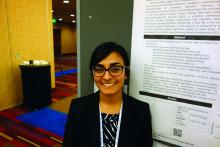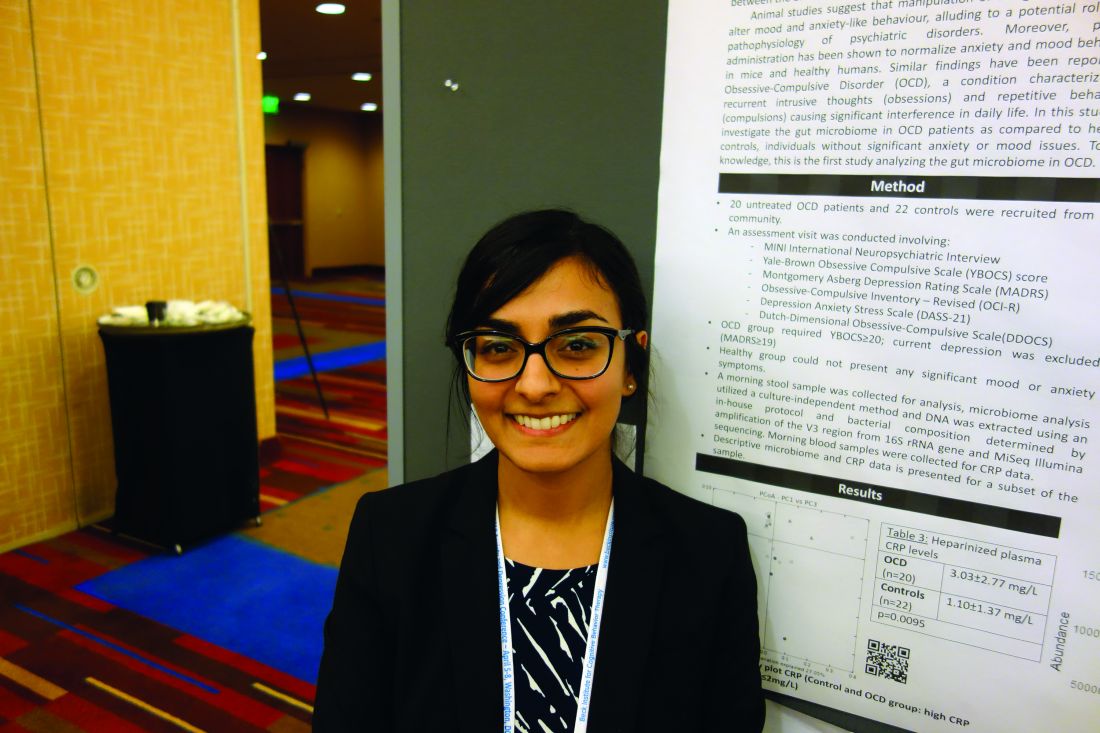User login
SAN FRANCISCO – Patients with obsessive-compulsive disorder have a gut bacterial microbiome marked by diminished species diversity and abundance, compared with that of healthy controls, according to the first study to examine the issue.
Results of this pilot study also suggest that OCD patients with tic disorder have a distinctly different gut microbiome, compared with other OCD patients, Jasmine Turna said at the annual conference of the Anxiety and Depression Association of America.
She reported on 11 OCD patients and 12 healthy controls who underwent gut microbiome analysis using DNA extracted from their morning stool samples. Results from another nine OCD patients and 10 controls remained pending at the time of the conference but will be completed shortly.
In addition to the decreased abundance and diversity of bacteria present in the microbiomes of the OCD patients, compared with controls, another key finding was that the OCD patients had increased levels of systemic inflammation. Their mean level of high-sensitivity C-reactive protein was 3.03 mg/L, compared with 1.1 mg/L in the controls. In addition, the microbiome in those OCD patients who had elevated systemic inflammation as defined by a CRP level greater than 2.0 mg/L was more restricted than was that of OCD patients with a normal-range CRP.
In an interview, Ms. Turna noted that a cross-sectional study such as this is hypothesis generating and not definitive. Even if these findings are replicated, that will not answer the key question of whether the altered microbiome present in OCD patients is a contributing cause or a consequence of the psychiatric disorder. But she and her coinvestigators already have launched a prospective randomized controlled trial that attempts to address this question by having a group of OCD patients regularly consume a probiotic in an effort to diversify their gut microbiome.
“Maybe getting more fermented foods into the diet – kimchi, miso, yogurt, kefir – could be an adjunctive therapy,” she said. “Right now, OCD research is kind of at a standstill. Our treatments work in a lot of people, but they also don’t work in a lot of people. Our research opens up a new place to explore.”
Ms. Turna reported having no financial conflicts.
SAN FRANCISCO – Patients with obsessive-compulsive disorder have a gut bacterial microbiome marked by diminished species diversity and abundance, compared with that of healthy controls, according to the first study to examine the issue.
Results of this pilot study also suggest that OCD patients with tic disorder have a distinctly different gut microbiome, compared with other OCD patients, Jasmine Turna said at the annual conference of the Anxiety and Depression Association of America.
She reported on 11 OCD patients and 12 healthy controls who underwent gut microbiome analysis using DNA extracted from their morning stool samples. Results from another nine OCD patients and 10 controls remained pending at the time of the conference but will be completed shortly.
In addition to the decreased abundance and diversity of bacteria present in the microbiomes of the OCD patients, compared with controls, another key finding was that the OCD patients had increased levels of systemic inflammation. Their mean level of high-sensitivity C-reactive protein was 3.03 mg/L, compared with 1.1 mg/L in the controls. In addition, the microbiome in those OCD patients who had elevated systemic inflammation as defined by a CRP level greater than 2.0 mg/L was more restricted than was that of OCD patients with a normal-range CRP.
In an interview, Ms. Turna noted that a cross-sectional study such as this is hypothesis generating and not definitive. Even if these findings are replicated, that will not answer the key question of whether the altered microbiome present in OCD patients is a contributing cause or a consequence of the psychiatric disorder. But she and her coinvestigators already have launched a prospective randomized controlled trial that attempts to address this question by having a group of OCD patients regularly consume a probiotic in an effort to diversify their gut microbiome.
“Maybe getting more fermented foods into the diet – kimchi, miso, yogurt, kefir – could be an adjunctive therapy,” she said. “Right now, OCD research is kind of at a standstill. Our treatments work in a lot of people, but they also don’t work in a lot of people. Our research opens up a new place to explore.”
Ms. Turna reported having no financial conflicts.
SAN FRANCISCO – Patients with obsessive-compulsive disorder have a gut bacterial microbiome marked by diminished species diversity and abundance, compared with that of healthy controls, according to the first study to examine the issue.
Results of this pilot study also suggest that OCD patients with tic disorder have a distinctly different gut microbiome, compared with other OCD patients, Jasmine Turna said at the annual conference of the Anxiety and Depression Association of America.
She reported on 11 OCD patients and 12 healthy controls who underwent gut microbiome analysis using DNA extracted from their morning stool samples. Results from another nine OCD patients and 10 controls remained pending at the time of the conference but will be completed shortly.
In addition to the decreased abundance and diversity of bacteria present in the microbiomes of the OCD patients, compared with controls, another key finding was that the OCD patients had increased levels of systemic inflammation. Their mean level of high-sensitivity C-reactive protein was 3.03 mg/L, compared with 1.1 mg/L in the controls. In addition, the microbiome in those OCD patients who had elevated systemic inflammation as defined by a CRP level greater than 2.0 mg/L was more restricted than was that of OCD patients with a normal-range CRP.
In an interview, Ms. Turna noted that a cross-sectional study such as this is hypothesis generating and not definitive. Even if these findings are replicated, that will not answer the key question of whether the altered microbiome present in OCD patients is a contributing cause or a consequence of the psychiatric disorder. But she and her coinvestigators already have launched a prospective randomized controlled trial that attempts to address this question by having a group of OCD patients regularly consume a probiotic in an effort to diversify their gut microbiome.
“Maybe getting more fermented foods into the diet – kimchi, miso, yogurt, kefir – could be an adjunctive therapy,” she said. “Right now, OCD research is kind of at a standstill. Our treatments work in a lot of people, but they also don’t work in a lot of people. Our research opens up a new place to explore.”
Ms. Turna reported having no financial conflicts.
AT ANXIETY AND DEPRESSION CONFERENCE 2017
Key clinical point:
Major finding: Patients with obsessive-compulsive disorder have a gut bacterial microbiome that is distinctly different from healthy controls, with less abundance and species diversity.
Data source: This study analyzed DNA extracted from morning stool samples to map the gut microbiomes of 11 patients with obsessive-compulsive disorder and 12 healthy controls.
Disclosures: The study presenter reported having no financial conflicts.

